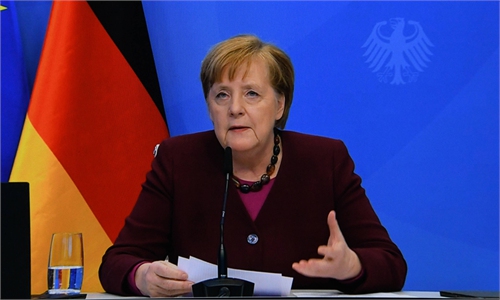Merkel seizes reins for COVID-19 controls
Berlin centralizes commands in wider efforts to eradicate wild epidemic
The German government was expected to agree on Tuesday on the changes to a national infections control law which would hand Berlin more centralized power to impose sweeping measures to curb the raging coronavirus pandemic.
The proposed changes, criticized by some states, could give Chancellor Angela Merkel's government the power to impose night-time curfews and close schools in areas with high infection rates.
The move aims to end a political tug-of-war between the federal government and powerful regions over coronavirus measures, as Germany remains gripped by a dangerous third wave of the pandemic which is putting increased strain on the country's health system.
Currently coronavirus measures are decided on in consultation with Berlin and - in theory - implemented by the federal states.
Yet in many cases, regional leaders have failed to put in place shutdown measures to which they agreed with Merkel, with some even allowing shops and cinemas to reopen.
At a news conference on Monday, Merkel's spokesperson Steffen Seibert said the new law aimed to create "uniform national" rules.
"The aim is to bring the country as quickly as possible to a situation with much lower infection rates at which we can responsibly ease restrictions with testing," he said.
Regular meetings between Berlin and the regions to set Germany's coronavirus policies have been marked by bitter disputes and spotty compliance in recent weeks.
Most notably, some states have not followed through on an agreement to row back on the easing of measures in areas where the seven-day incidence rate exceeds 100 new infections per 100,000 people.
The adjusted law set to pass cabinet on Tuesday would give Berlin the power to enforce this "emergency brake."
Measures included a night-time curfew between 9 pm and 5 am, the closing of non-essential shops and restricting private gatherings to five people from two households.
The draft would also see Berlin force schools, usually strictly within the remit of the federal states, to revert to virtual teaching in most cases.
Yet amid fierce criticism from some regional leaders, Seibert said Monday that discussions over details were still ongoing.
Lower Saxony's interior minister Boris Pistorius told Die Welt newspaper on Monday that it was a "big mistake to take power from the regions in the middle of a crisis."
The German Association of Towns and Municipalities also criticized the plans, telling the Rheinische Post that the proposed curfews were "constitutionally problematic."
The changes would also still have to pass through parliament, where Merkel's right-left coalition has a majority.
The proposed changes, criticized by some states, could give Chancellor Angela Merkel's government the power to impose night-time curfews and close schools in areas with high infection rates.
The move aims to end a political tug-of-war between the federal government and powerful regions over coronavirus measures, as Germany remains gripped by a dangerous third wave of the pandemic which is putting increased strain on the country's health system.
Currently coronavirus measures are decided on in consultation with Berlin and - in theory - implemented by the federal states.
Yet in many cases, regional leaders have failed to put in place shutdown measures to which they agreed with Merkel, with some even allowing shops and cinemas to reopen.
At a news conference on Monday, Merkel's spokesperson Steffen Seibert said the new law aimed to create "uniform national" rules.
"The aim is to bring the country as quickly as possible to a situation with much lower infection rates at which we can responsibly ease restrictions with testing," he said.
Regular meetings between Berlin and the regions to set Germany's coronavirus policies have been marked by bitter disputes and spotty compliance in recent weeks.
Most notably, some states have not followed through on an agreement to row back on the easing of measures in areas where the seven-day incidence rate exceeds 100 new infections per 100,000 people.
The adjusted law set to pass cabinet on Tuesday would give Berlin the power to enforce this "emergency brake."
Measures included a night-time curfew between 9 pm and 5 am, the closing of non-essential shops and restricting private gatherings to five people from two households.
The draft would also see Berlin force schools, usually strictly within the remit of the federal states, to revert to virtual teaching in most cases.
Yet amid fierce criticism from some regional leaders, Seibert said Monday that discussions over details were still ongoing.
Lower Saxony's interior minister Boris Pistorius told Die Welt newspaper on Monday that it was a "big mistake to take power from the regions in the middle of a crisis."
The German Association of Towns and Municipalities also criticized the plans, telling the Rheinische Post that the proposed curfews were "constitutionally problematic."
The changes would also still have to pass through parliament, where Merkel's right-left coalition has a majority.

